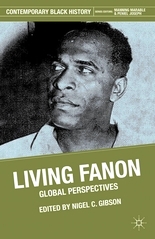
Mr Richard Pithouse, lecturer in the department of Politics and International Studies, recently presented “Fidelity to Fanon”, which highlights aspects of Frantz Fanon’s philosophy and applies them to aspects of contemporary political life, as part of the 2011 Critical Studies Seminar Series, hosted by the Departments of Politics and International Studies and Sociology.
Born in Martinique in 1925, Fanon’s work was influential in the fields of post-colonial studies, critical theory and Marxism. Known as a radical existential humanist thinker on the issue of decolonisation and the psychopathology of colonisation, Fanon’s life and works have inspired anti-colonial liberation movements for more than four decades.
Fanon’s writings on “the moment when the 'liberating lava' of the great anti-colonial struggles was diverted as the people were expelled from history, 'sent back to their caves' by leaders who, 'instead of welcoming the expression of popular discontentment' and the 'free flow of ideas', proclaim that the vocation of their people is to obey,” formed a central tenet in Mr Pithouse’s paper, which considered the limitations placed on political agency in South Africa.
Mr Pithouse writes that Fanon’s “radical humanism” involves an “affirmation of absolute equality, an orientation to all of humanity, a commitment to the self management of property held in common”, and that extracting ethical elements such as these from Fanon’s work could prove useful when applied to contemporary life. “Fanon’s argument in his last book is specific to the moment of African decolonisation but it also reaches out to broader contexts,” he said.
When considering the agency of the poor in South Africa, and how they are treated by authorities in the state and in civil society, Mr Pithouse suggested that one should not “assume that the state is a progressive actor”, because a general complicity with oppression is often facilitated by a kind of “dual-democratic system” in which not everyone enjoys democratic freedoms in practice.
The space of expression in society has at times collapsed into a hostile state backed authoritarianism and poor people’s movements have faced serious repression. He warned about complicity with an increasingly authoritarian state and asserted the need to defend the right to dissent in the popular sphere with the same vigour with which it is being defended in the elite public sphere.
Additionally, Mr Pithouse highlighted the tendency for modes of proposed transformation to be elitist and inaccessible to most people, including the organisations which profess to be acting in the interests of the poor. “South Africa has one of the highest rates of popular protest anywhere in the world ... [b]ut it has become clear that for much of the middle-class left, whether in the academy or NGOs, it is simply impossible to accept that there is a grassroots left. .... Real politics, it is assumed, is inevitably a contestation between the ideas of competing elites... But Fanon insisted that we should not lose sight of the real.”
Yet, Mr Pithouse suggested, “It is still necessary to think about popular politics, which can be reactionary and progressive, as a space that can exercise real power and to take a political position within spaces in which ordinary people can participate.” This aspect of Fanon’s work, Mr Pithouse suggested, is not redundant.
He concluded with a stress on the value of popular political empowerment outside of narrow electoral politics arguing that “people need to continue to organise (themselves).”
The paper, which forms the final chapter of Living Fanon: Global Perspectives, is edited by Nigel Gibson and was published recently by Macmillian.
For more information visit www.thinkingafricarhodesuniversity.blogspot.com
Story by Sarah-Jane Bradfield
